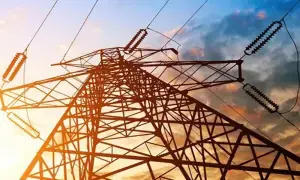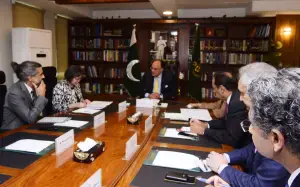Payments to IPPs being ‘hyped up’, says state finance minister
4 min readState Finance Minister Ali Pervaiz Malik has claimed that capacity payments made to the Independent Power Producers (IPPs) were being ‘hyped up’.
“Five per cent of the capacity charge which is less than 100 billion is that you attribute to the IPPs. So I don’t think its materiality is like it has been hyped up,” he said while appearing on Dus aired on Aaj News on Saturday.
On Friday, the National Assembly’s Standing Committee on Energy (Power Division) on Friday sought a detailed report on capacity payments to the IPPs.
Many politicians have blamed such payments for the exorbitant electricity bills which many people received in the summer seasons.
Last month, the government approved a per-unit price increase of up to Rs5.72% in electricity prices. The move, driven by the International Monetary Fund’s (IMF) demands for a bailout package, has sparked outrage and protests.
To address the matter, Prime Minister Shehbaz Sharif announced a three-month relief period for lifeline consumers of electricity whose consumption remains below 200 units per month.
While sharing the breakdown, the state finance minister said that half of the IPP problem started because the Government of Pakistan and various provincial governments put up thermal generation plants at record prices and at record speed after the 2014-15 policy.
“Rest, 45% of the capacity charge is of CPEC projects which are imported coal plants at Port Qasim, in Sahiwal and the rest of the plants. Nuclear also comes in this bucket,” he said.
According to Malik, the government would not be able to control tariffs even if such payments were not made. “Even forgoing equity of government plants, the problem will not go away as these plants are backed by commercial debt. 80% is on loans,” he said and added that the people should not vilify all those who “stood up in difficult times” for the country.
He called for improving the power sector system.
He went on to add that power plants were installed in Pakistan under three policies, including 1994, 2002, and 2014-15. The state minister said that the demand for electricity in Pakistan falls to 10-12,000MW in winters and goes to 25-30,000MW in summers depending on the constrained or unconstrained demands and the use of electricity in off-grid.
“When you have a single buyer market where the Government of Pakistan takes responsibility to buy all electricity and then sell to DISCOs and then to consumers, in this condition no one will install power plant if you don’t give them safeguard that to protect their bank’s interest rate and instalments. This is the concept of capacity charge.”
Malik said that such agreements cannot be converted, but added that the government has to see where such plants were installed at inflated costs or at genuine rates. “If there was any malpractice or theft, it should have been investigated. Accountability should be done as to why it has not been done so far and if the policy was wrong then those responsible should be held accountable.”
He admitted that the dollar-rupee parity aggravated the payment matter
“Around Rs18 is the capacity charge and it has its own constituents; Rs10 is the fuel cost; the loss in DISCOs is around Rs600 billion; Rs6 loss is in theft and lack of payment; Rs1 to Rs2 is line losses; Rs6 to Rs7 is taxation as we have not been able to widen our base. So if we resolve this, then we will be able to reduce tariff in long term,” Malik said.
Also, read this
Punjab to provide Rs14/unit relief to consumers using up to 500 units of electricity: Nawaz
Full breakdown: Here is how much you will pay for your units of electricity
He clarified that the government would not jeopardise the IMF framework. When asked, he said that the three-month relief would not create any crisis in the system as electricity consumption falls in winter and would create a “runaway” to bring reforms in the power sector.
In the next 10 to 15 days, he said that PM Shehbaz would tell people about the agenda of reforms by which the government would make the progress inclusive and long-term.
When asked about the Tajir Dost scheme, Malik described it as a “carrot and stick policy” and hoped to collect a decent amount from traders.
For the latest news, follow us on Twitter @Aaj_Urdu. We are also on Facebook, Instagram and YouTube.

























Comments are closed on this story.